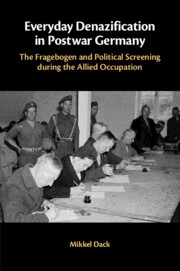 Everyday Denazification in Postwar Germany
Everyday Denazification in Postwar Germany Book contents
- Everyday Denazification in Postwar Germany
- Everyday Denazification in Postwar Germany
- Copyright page
- Contents
- Illustrations
- Tables
- Acknowledgments
- Abbreviations
- Maps
- Introduction
- 1 An Army of Academics
- 2 “A Miserable Paper Substitute for a Spontaneous Revolution”
- 3 “Land of the Fragebogen”
- 4 The “Little Man’s Nuremberg”
- 5 Writing Away Culpability
- Conclusion
- Appendix The Fragebogen Questions
- Bibliography
- Index
2 - “A Miserable Paper Substitute for a Spontaneous Revolution”
Drafting the Questionnaire
Published online by Cambridge University Press: 23 March 2023
- Everyday Denazification in Postwar Germany
- Everyday Denazification in Postwar Germany
- Copyright page
- Contents
- Illustrations
- Tables
- Acknowledgments
- Abbreviations
- Maps
- Introduction
- 1 An Army of Academics
- 2 “A Miserable Paper Substitute for a Spontaneous Revolution”
- 3 “Land of the Fragebogen”
- 4 The “Little Man’s Nuremberg”
- 5 Writing Away Culpability
- Conclusion
- Appendix The Fragebogen Questions
- Bibliography
- Index
Summary
Chapter 2 introduces the Fragebogen to analytical review and delivers the first history of the project’s origins. Here, analytical focus moves away from the policymaking architecture to the rudimentary construction of a functioning screening system. Tracing the questionnaire’s origins to 1943 Allied-occupied Italy, this chapter analyzes and compares the independent Fragebogen projects that emerged under American, British, French, and Soviet administrations and corrects previous interpretations about the scope and character of denazification. The decision to adopt a self-administered questionnaire was bold and experimental, but the Fragebogen was an inadequate mechanism for the complex task of judging Germans. The form was hastily written and contained both punitive and redemptive features, and by today’s standards, included undemocratic and arguably immoral questions. While trumpeted as a device for objective screening, the program allowed for subjective responses and discretionary evaluation. The development of the project did not show clarity and confidence, but stumbled forward out of necessity, indecision, and because of the absence of any alternative strategy.
Keywords
- Type
- Chapter
- Information
- Everyday Denazification in Postwar GermanyThe Fragebogen and Political Screening during the Allied Occupation, pp. 65 - 110Publisher: Cambridge University PressPrint publication year: 2023
